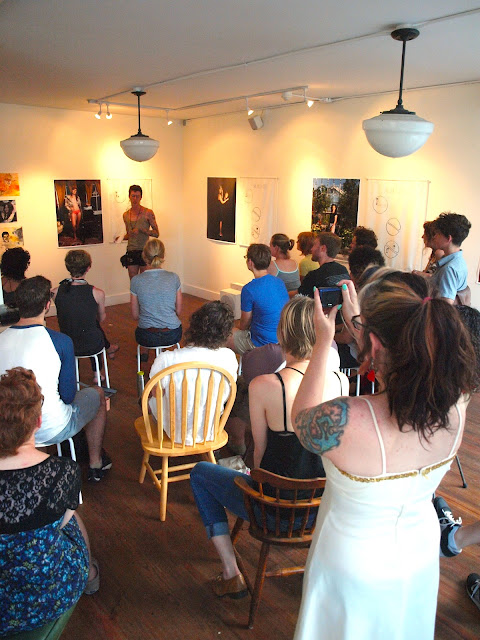 there is a home for this!
there is a home for this!yay yay yay!
those words kept landing with a thud in my stomach throughout the 2 weeks of Earth Activist Training. They landed like comfort, like warm tea on a cold day. Mmmmm, relax, spread out, there's a home for this and you're inside it.
I've had a funny hunch that permaculture is an important lens for me. I've worktraded on permaculture sites, tried (unsuccessfully... so far) to get permaculture classes started, written articles about queer permaculture (more on that some other time). But honestly it was all a hunch - my own experience was my greatest proof that permaculture and real liberatory social justice are one in the same. we can talk about composting our poop into fertile soil one moment and then discuss effective methods of direct action the next? we can talk about dealing with police brutality in the same breath as rainwater harvesting? oh wow oh wow yes!
 Starhawk's E.A.T. course, which she taught with Charles Williams, is freaking amazing. As she went over the syllabus each item lodged itself in another nook of my brain, found a fold yearning for exactly that flavor to chew on. There was already space for this knowledge, all i needed was the content to fill in the corners and expand the edges of this now-huge space.
Starhawk's E.A.T. course, which she taught with Charles Williams, is freaking amazing. As she went over the syllabus each item lodged itself in another nook of my brain, found a fold yearning for exactly that flavor to chew on. There was already space for this knowledge, all i needed was the content to fill in the corners and expand the edges of this now-huge space. this approach to permaculture constantly examines the human relationships that go down alongside the earth sustainability work. we spent 2 nights talking about non-hierarchical organizing and methods to make a meeting functional fun and effective. we talked about magical activism. baby we even devised some magical activism.
On the activism front, this shit is potent. After so much analysis, heartache and headbreak over Occupy, I came to quite a few conclusions about what makes organizing work. It all aligns with permaculture principles. Observe first. Value the marginal, the edges, those with less power. Form coalitions that can thrive autonomously, not with constant leadership from outside. I could go on. Permaculture extends these ideas into physical realities. It explains through a lens of natural systems that makes these abstract concepts so much more tenable. Diversity isn't just a cute thing people think theyre supposed to want. it is the core essential necessity of a healthy reality. Blam. If you look at something as if it's a problem, it will stay a problem. if you look at something as if it's information, than it's a solution. Blam.
 Also, the intergenerationality of the group was as important as the course content. I have been hungering for relationship with my elders. Here i found many generations interwoven and conscious of how important this fabric is for any future progress. We talked about the struggle to expand the narrowing confines of gender binaries, how to talk about a goddess who is not only a goddess, what earlier feminist movements have to teach youth today and what healing needs to take place. Many new questions, and damn it felt good to sit with people who aren't within 15 years of my age.
Also, the intergenerationality of the group was as important as the course content. I have been hungering for relationship with my elders. Here i found many generations interwoven and conscious of how important this fabric is for any future progress. We talked about the struggle to expand the narrowing confines of gender binaries, how to talk about a goddess who is not only a goddess, what earlier feminist movements have to teach youth today and what healing needs to take place. Many new questions, and damn it felt good to sit with people who aren't within 15 years of my age. Permaculture is as ancient as humanity. This word encapsulates a whole history of people living together with the earth. These past 2 weeks I felt for the first time that I was honoring the ancestors and indigenous peoples of this land in a way that was authentic and active, not guilt-ridden and defeated.
this is the beginning of something. Spirit and magic can be manifested and harnessed to increase human capacity for love and creativity. this is no joke, no subtle thing. This is the power ritual holds for the transformation of life. I'm telling ya. I've held such a distance between myself and spirituality for so long, the vestiges of scientific conditioning clinging to me and hissing "that doesn't make sense!". But here i found that the things that inspire me about science can be the wellspring from which my spirituality gushes - i can marvel at cells and water and star dust and pound the earth in ecstatic frothing. Woopee!














